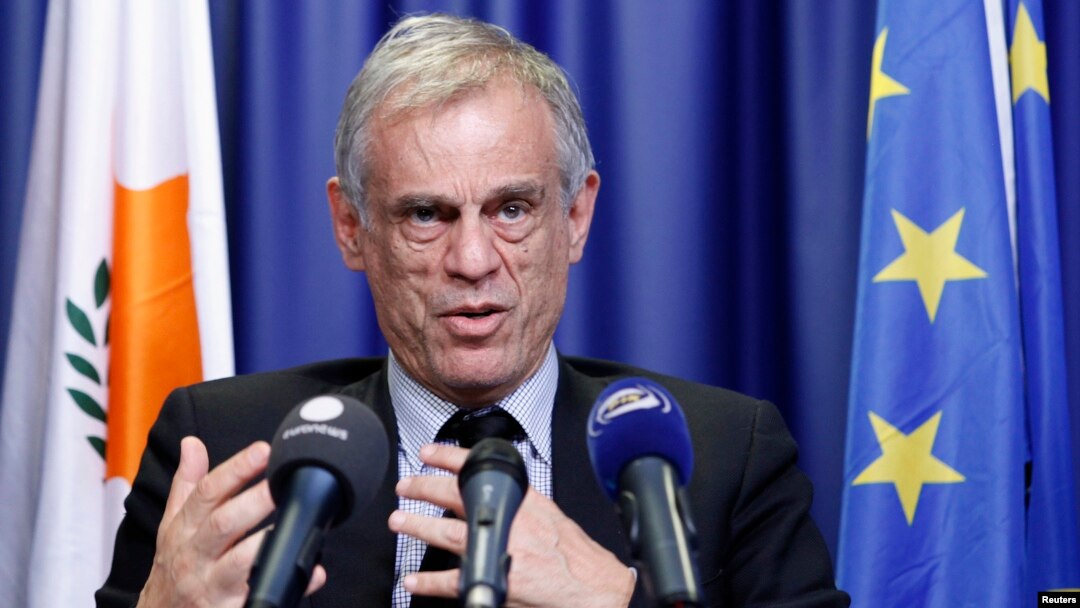Stock markets rallied and politicians praised a European Union and International Monetary Fund bailout agreement for Cyprus reached early Monday after marathon talks in Brussels. But analysts predict difficulties ahead for the country as it tries to get onto a more sustainable economic footing.
The $13 billion bailout agreement for Cyprus ends days of financial upheaval and speculation that the tiny island nation might pull out of the 17-member euro currency union.
Speaking to reporters after the talks ended in Brussels, Cypriot Finance Minister Michalis Sarris hailed the deal.
"A long period of uncertainty and insecurity surrounding the Cyprus economy has ended. I believe we have averted literally the possibility of bankruptcy and we have assured the prospects for generations to come," Sarris said.
Watch related video of Cyprus bailout:
Also attending the meeting was International Monetary Fund chief Christine Lagarde, who said the talks had yielded a "good result." Lagarde said she would recommend the IMF contribute to the bailout package.
"We believe this will form a lasting, durable and fully financed solution," she said.
The deal radically cuts Cyprus's oversized banking sector, and forces losses on depositors holding more than 100,000 euros (about $130,000) in savings. It also calls on the government to cut spending and carry out economic reforms, including privatizing state assets.
In the short term, economist Tomasz Michalski, of the HEC business school in Paris, predicts Cyprus will likely sink further into recession as it struggles to meet the bailout terms and turn around its economy.
"A lot of people are going to become unemployed. Probably, they're going to have to raise taxes, because there was a very low tax environment," he predicted. "They're going to have to cut government spending a lot, retirement pensions."
Michalski says big foreign depositors in Cypriot banks, including Russians and Britons, will also take a big hit.
"There's a shockwave [going] through all this world of nice, offshore, tax-free havens. If something is going to happen through a tax-free haven, that's the risk you place to hold your money," he warned. "From the perspective of all the high-tax governments in the eurozone, like France, Belgium and Germany, where we know there is a lot of tax avoidance and tax evasion, this is very good news."
The bailout deal ensures that the European Central Bank will continue providing funding to Cypriot banks. But Brussels-based European Policy Center analyst Janis Emmanouilidis says it also means Cyprus must now find another growth strategy.
"What the Cypriots have and what their hopes are is that what they're losing in one sector - in the banking sector - they'll be able to cover in the energy sector," noted Emmanouilidis. " Because of the energy [oil] being found off the coast of Cyprus. But that will take a while. It will take a couple of years before these things can be exploited fully."
With the agreement, Cyprus now joins Greece, Ireland and Portugal, who have also received bailouts since the eurozone crisis began in 2009.
The $13 billion bailout agreement for Cyprus ends days of financial upheaval and speculation that the tiny island nation might pull out of the 17-member euro currency union.
Speaking to reporters after the talks ended in Brussels, Cypriot Finance Minister Michalis Sarris hailed the deal.
"A long period of uncertainty and insecurity surrounding the Cyprus economy has ended. I believe we have averted literally the possibility of bankruptcy and we have assured the prospects for generations to come," Sarris said.
Watch related video of Cyprus bailout:
Your browser doesn’t support HTML5
Related video of Cyprus bailout
Also attending the meeting was International Monetary Fund chief Christine Lagarde, who said the talks had yielded a "good result." Lagarde said she would recommend the IMF contribute to the bailout package.
"We believe this will form a lasting, durable and fully financed solution," she said.
The deal radically cuts Cyprus's oversized banking sector, and forces losses on depositors holding more than 100,000 euros (about $130,000) in savings. It also calls on the government to cut spending and carry out economic reforms, including privatizing state assets.
In the short term, economist Tomasz Michalski, of the HEC business school in Paris, predicts Cyprus will likely sink further into recession as it struggles to meet the bailout terms and turn around its economy.
"A lot of people are going to become unemployed. Probably, they're going to have to raise taxes, because there was a very low tax environment," he predicted. "They're going to have to cut government spending a lot, retirement pensions."
Michalski says big foreign depositors in Cypriot banks, including Russians and Britons, will also take a big hit.
"There's a shockwave [going] through all this world of nice, offshore, tax-free havens. If something is going to happen through a tax-free haven, that's the risk you place to hold your money," he warned. "From the perspective of all the high-tax governments in the eurozone, like France, Belgium and Germany, where we know there is a lot of tax avoidance and tax evasion, this is very good news."
The bailout deal ensures that the European Central Bank will continue providing funding to Cypriot banks. But Brussels-based European Policy Center analyst Janis Emmanouilidis says it also means Cyprus must now find another growth strategy.
Eurozone Bailouts
Countries that received Eurozone bailouts:- Spain, 2012: $129 billion
- Portugal, 2011: $100 billion
- Ireland, 2010: Ireland: $110 billion
- Greece, 2010 & 2012: $316 billion
With the agreement, Cyprus now joins Greece, Ireland and Portugal, who have also received bailouts since the eurozone crisis began in 2009.
The Eurozone's 5 Bailouts


